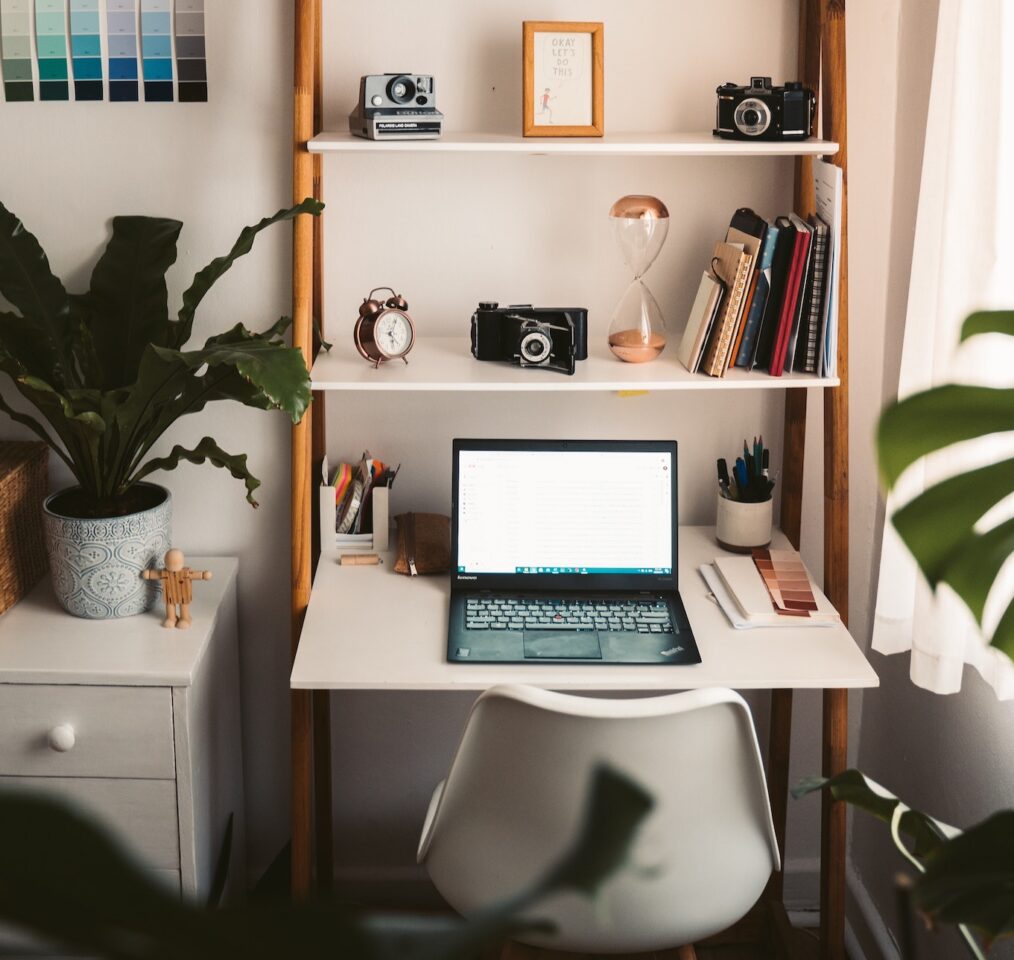
COVID-19 and well-being at work: How to create control around your work, help yourself and others
Last fall, Mindwise organized a Science Communication Workshop for BSS ReMa and RUG PhD students. Participants in this workshop learned to communicate science to the general public by means of informing, giving an opinion, and relating science to issues in society. A selection of these blog posts is published on Mindwise. Today’s post is by Iustina Armasu.
“Unprecedented times”, “Stay safe”– inboxes have been overflowing with such messages this year. Indeed, COVID-19 has affected our life in numerous ways. It’s transformed the way we move, the things we buy, the way we meet people, and redefined happiness. It has also left traces on the workplace, and maybe even reinvented work forever. While before you might have dreaded getting ready for a meeting or commuting to work, you may now dream about physically seeing and sharing a coffee with your colleagues. You might miss your office, photos on your desk, the smell of freshly printed paper and maybe even your supervisor. You may be one of the many employees whose well-being was affected by this crisis. How can you help yourself, colleagues and friends during these times? How can you avoid making it even worse? Such questions bear asking.
What helps?
As with every crisis, the first soldier to fall is our sense of control. We become more anxious, more stressed and tend to hold on to the “normal”, convincing ourselves it shall soon pass (Chong et al., 2020). After a while, this becomes difficult, as we see no light at the end of the tunnel. This in turn hinders our well-being and performance at work (Trougakos et al., 2020). Luckily, researchers have devised some solutions on how to create control around your work.
-
Engage in job crafting.
Working from home has limited the amount of control you have over your tasks and environments, with increased levels of workload and hampered work-life balance (Trougakos et al., 2020). But it also gave you the opportunity to reassess the role of work in your life and to reflect on your work. Kniffin et al. (2020) recommend that job crafting can be helpful during crises, as it can help individuals regain a sense of control in face of demanding work tasks. Here’s how you do it:
Job crafting means actively changing one’s work or perceptions about work (Wrzesniewski & Dutton, 2001). For example, you might want to change the scope of your task by taking on a new project from which you can develop certain skills. Alternatively, you can organize your work so that your daily work tasks do not feel overwhelming or by redefining nasty work tasks and aligning them with your goals (for example, redefining going through that immense excel sheet into an exercise of patience). Further, you can create meaning around your work. I’ll give you a quote that helped me personally during these times: “The one that has a why, can bear any how” (Frankl, 1946). It might be helpful to reflect on what gives you purpose at work, why are you doing the job you chose. When a nasty task or a boring meeting comes your way, keep your “why” in the back of your mind.
When a nasty task or a boring meeting comes your way, keep your “why” in the back of your mind
-
Create a routine.
This cannot be stressed enough. Evolutionarily, we prefer routines because we know what is coming, so our cognition does not need to be alert for something unexpected, i.e., a danger. Therefore, routines can put you in a good mood, and create a sense of safety (Avni-Babad, 2011). Moreover, incorporating routines in your daily life can boost your energy at work (McClean et al., 2020). Because routine behaviors are automatic, they do not require executive functioning. Therefore, your energy is conserved for other, more important tasks. For example, you might create a specific morning routine that makes you feel good like stretching after you wake up, having a hearty breakfast or meditating. Or you may want to incorporate a lunch routine and go outside for a walk during your break. Finally, routines can help you get through hard times when performed in a group. Family routines like having dinner together, going for a walk after work, etc. can increase your sense of belonging and help you experience emotional support, so you can also provide it to your loved ones.
-
Check on colleagues
The benefits of social support also cross family boundaries and impact the workplace. Ruiz-Frutos et al. (2020) found that 85% of their respondents believed that psychological support at work should be provided to employees especially during COVID-19. Research also shows that remote workers perform better when they experience social support from colleagues via task assistance or emotional encouragement (Kirkman et al., 2002). Informal meetings, even virtually, can increase the experience of social support, because they combat feelings of loneliness and create a sense of togetherness (Wang et al., 2020). In difficult times, it’s important to know that you’re not alone. Thus, don’t forget to check on your colleagues and see how they are doing. You never know what a small conversation can change for another person’s mental health.
In difficult times, it’s important to know that you’re not alone
What Hampers?
Sometimes we can create difficulties for our own well-being. This becomes especially important during a crisis, when we might try solutions that we believe to be beneficial. But this can prove otherwise. Research shows that certain behaviors hamper our well-being at work; while they might create the illusion of high performance, they only promote burnout and exhaustion in the long run.
-
Always being available
Are you one of those people who answers an e-mail immediately, even after 8pm? Maybe you too are providing extended availability at work. Like many others, you may think: “the more I work, the better I perform”. However, in the long-run extended availability decreases well-being and increases the risk of burnout (Detmerrs et al., 2016). Thus, it is important to know when to stop, especially if you’re working from home. When your dinner table becomes your working desk and your home becomes your office, creating boundaries between non-work and work is essential for detaching after work. This way, you can dedicate your time and attention to other life matters and –most importantly– allow yourself to recover (Mellner, 2016). Research suggests that creating working hours and completely reducing availability of work-related cues like your laptop or your email can help with creating a boundary between work and home (Mellner, 2016). Next time, consider turning off notifications from your work e-mail until the next day, shutting off your computer and closing “the office” for the day. You might feel more energized and less grumpy, and may create more balance in your life.
Creating boundaries between non-work and work is essential for detaching after work
-
Suppressing your emotions
We’ve all had to deal with some bad stuff this year, and it has inevitably generated a bunch of negative emotions. Better said, a lot of negative emotions. From fear to sadness, each of us has had to choose how to deal with and control these emotions. Interestingly, the way we cope with negative emotions can impact work, but also personal relationships. For example, Trougakos et al. (2020) investigated how workers from diverse fields cope emotionally with COVID-19. They found that one recipe for disaster is to engage in emotional suppression, an emotion-focused coping strategy whereby people hide their emotions. People who engaged in emotion suppression were more likely to be less effective at work, have more health complaints and worse family engagement. In contrast, they found that problem-focused coping, i.e., managing the problem causing the distress rather than emotion-focused coping, was more effective in combatting anxiety caused by COVID-19. For example, the researchers found that hand-washing –a very relevant problem-focused coping during COVID-19– can be effective in helping people regain a sense of control and mitigating the anxiety caused by COVID-19. Effective coping is essential for your mental health, thus, being aware of your emotions and focusing on the problem can help you get by during a crisis and preserve your well-being.
-
Doing it all on your own
There are many reasons why employees don’t ask for help at work. For example, they might not seek help because it may seem to imply incompetence or dependability (Lee, 1997). However, it is important that you ask for help when things get tough. This can take many forms such as asking for feedback, seeking help about a work task or asking for social support. All in all, seeking help can increase your performance by facilitating learning and decreasing uncertainty (Bamberger, 2009). Willingness to seek help can also protect your well-being by increasing your stress-coping skills (Bamberger, 2019). Moreover, Kniffin et al. (2020) suggest that during crises such as COVID-19, people are also more willing to give help and its quality is higher. All in all, helping behaviors are beneficial for both the help-seeker and the help-giver, as they can create a space of hope and certainty. Therefore, do not neglect the power of help: seek it and give it to others when needed.
Helping behaviors are beneficial for both the help-seeker and the help-giver, as they can create a space of hope and certainty
Concluding Thoughts
The strongest weapon of a crisis is uncertainty. And while this uncertainty seems daunting, you can create some control around your work and life with these evidence-based know-hows. Every crisis is bound to end, and this one will, too. But before we reach that, take care of your mind and body, check on others and safeguard your well-being.
Image credit: photo by Taryn Elliott from Pexels.
References
Avni-Babad, D. (2011). Routine and feelings of safety, confidence, and well-being. British Journal of Psychology, 102(2), 223–44. https://doi.org/10.1348/000712610X513617
Bamberger, P. (2009). Employee help-seeking: Antecedents, consequences and new insights for future research. In Martocchio, J.J. and Liao, H. (Ed.) Research in Personnel and Human Resources Management (Research in Personnel and Human Resources Management, Vol. 28), Emerald Group Publishing Limited, Bingley, pp. 49-98. https://doi.org/10.1108/S0742-7301(2009)0000028005
Chong, S. H., Huang, Y., & Chang, C.-H. (D. (2020). Supporting interdependent telework employees: a moderated-mediation model linking daily covid-19 task setbacks to next-day work withdrawal. Journal of Applied Psychology, 105(12), 1408–1422. https://doi.org/10.1037/apl0000843
Dettmers, J., Bamberg, E., & Seffzek, K. (2016). Characteristics of extended availability for work: The role of demands and resources. International Journal of Stress Management, 23(3), 276–297. https://doi-org.proxy-ub.rug.nl/10.1037/str0000014
Frankl, V. (1946). Man’s search for meaning. Beacon Press. ISBN: 9780807014295
Kirkman, B. L., Rosen, B., Gibson, C. B., Tesluk, P. E., & McPherson, S. O. (2002). Five challenges to virtual team success: lessons from sabre, inc. The Academy of Management Executive, 16(3), 67–79.
Kniffin, K. M., Narayanan, J., Anseel, F., Antonakis, J., Ashford, S. P., Bakker, A. B., … Vugt, M. V. (2020). Covid-19 and the workplace: implications, issues, and insights for future research and action. The American Psychologist, 2020 Aug 10. https://doi.org/10.1037/amp0000716
Lee, Fiona. (1997). When the going gets tough, do the tough ask for help? help seeking and power motivation in organizations. Organizational Behavior and Human Decision Processes, 72(3), 336–363. https://doi.org/10.1006/obhd.1997.2746
Mellner, Christin (2016). After-hours availability expectations, work-related smartphone use during leisure, and psychological detachment. International Journal of Workplace Health Management, 9(2), 146–164. doi:10.1108/ijwhm-07-2015-0050
Ruiz-Frutos, C., Ortega-Moreno, M., Allande-Cussó, R., Ayuso-Murillo, D., Domínguez-Salas, S., & Gómez-Salgado, J. (2020). Sense of coherence, engagement, and work environment as precursors of psychological distress among non-health workers during the covid-19 pandemic in Spain. Safety Science, 133.
Trougakos, J. P., Chawla, N., & McCarthy, J. M. (2020). Working in a pandemic: exploring the impact of covid-19 health anxiety on work, family, and health outcomes. Journal of Applied Psychology, 105(11), 1234–1245.
Wang, B., Liu, Y., Parker, S. K., & Qian, J. (2020). Achieving effective remote working during the covid-19 pandemic: a work design perspective. Applied Psychology, (2020). https://doi.org/10.1111/apps.12290
Wrzesniewski, A., & Dutton, J. E. (2001). Crafting a job: Revisioning employees as active crafters of their work. Academy of Management Review, 26, 179–201. http://dx.doi.org/10.5465/amr.2001.4378011



